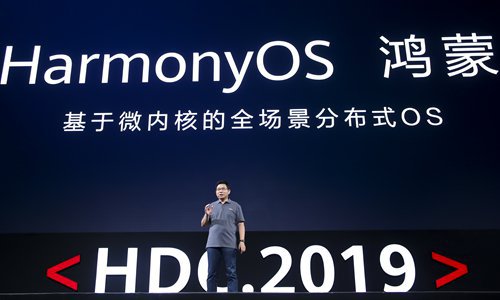HOME >> CHINA
'Not shocking' to replace foreign equipment
By Yang Sheng and Chen Qingqing Source:Global Times Published: 2019/12/9 22:58:40
Chinese govt's decision meant to prevent US cyber security threats: experts

Yu Chengdong, CEO of Huawei's consumer business, unveils the company's HarmonyOS on Friday in Dongguan, South China's Guangdong Province. Photo: Courtesy of Huawei
Foreign media was shocked by a report on Chinese government's decision to replace foreign made computer equipment and software within three years, and believe this is a Chinese approach to deal with US pressure on trade and science and technology, but Chinese experts said this has been a long-existing trend.No Chinese authority confirmed the report, but Chinese experts said replacing foreign-made equipment is the goal for many institutes, departments and organizations in China, not only in the government, law-enforcement agencies and national security departments, but also in scientific research institutes and the military, since security is the top priority.
Financial Times (FT) reported the news on Monday, and noting that this was "a potential blow to the likes of HP, Dell and Microsoft."
The report said the move is part of a broader campaign to increase China's reliance on home-made technologies, and is likely to fuel concerns of "decoupling," as supply chains between the US and China being severed.
Shen Yi, a professor at Shanghai-based Fudan University, told the Global Times that linking the issue with trade was unprofessional, because long before the China-US trade war, the Chinese government had already started to reduce its reliance on foreign-made equipment step by step.
Earlier this year, Washington banned US companies from doing business with Chinese telecoms equipment maker Huawei, and is looking at ways to help funnel money to its European rivals.
Shen noted that "Compared to doing business, data and cyber security is far more important in this era, and many members of the international community remember the Edward Snowden and PRISM surveillance program. And they have bad memories, even fear, of the US cyber security threat."
China's move to replace foreign-made computer equipment is meant to prevent and defend such threats from happening, and other countries shouldn't be worried, Shen said.
FT also quoted "Analysts at China Securities," saying that a broker estimated that 20-30 million pieces of hardware will need to be swapped as a result of the Chinese directive, with large scale replacement beginning next year.
It's highly likely that homegrown software and computer hardware could substitute foreign ones, considering the growing capabilities of domestic firms in making technology breakthroughs and coming up with self-developed servers and core chipsets, analysts said.
For example, Huawei could enter the desktop PC market as its homegrown Kunpeng 829 chipset helps power a new motherboard, and the firm could further move forward in entering the server sector, said Xiang Ligang, director-general of the Beijing-based Information Consumption Alliance.
"In terms of the ecosystem built up on new software and hardware, because public and administrative institutions have a special use environment, there is no such demand for building a new ecosystem." Xiang said.
Replacing foreign products with domestic ones is considered not only an opportunity for Huawei but also other leading domestic tech firms such as Lenovo and Inspur.
China had developed its homegrown operating system before Huawei came up with HarmonyOS. The Chinese Academy of Sciences developed Linux, or Red Flag Software, as an alternative to Windows, years ago. With Huawei's development of its homegrown operating system HarmonyOS in August, it is expected that development of Chinese operating system would also accelerate, analysts said.
"It's also very necessary," Xiang said, noting that besides security concerns, in case the US cuts supply if bilateral ties continue to deteriorate, government institutions would have back-up plans.
RELATED ARTICLES:
Posted in: SOCIETY